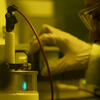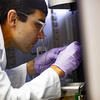Scope of Research
The Smart Biomaterials Research Laboratory is dedicated to the development of advanced biomaterials designed to interact dynamically with biological systems, aiming to enhance oral and systemic health. Our interdisciplinary approach integrates materials science, microbiology, bioengineering, and clinical dentistry to create innovative solutions for disease prevention, diagnosis, and treatment.
Key Research Areas:
- Stimuli-Responsive (Bioactive) Biomaterials: Designing materials that respond to mechanical, chemical, or electrical stimuli to release therapeutic agents or modulate biological responses in real-time.
- Antimicrobial and Microbiome Modulation Strategies: Developing surfaces and materials with inherent properties to prevent or disrupt biofilm formation, targeting pathogens such as Candida albicans and Streptococcus mutans, while investigating how material properties influence microbial community structure to maintain or restore microbial balance.
- Tissue Regeneration and Remineralization: Engineering scaffolds and composites that promote the regeneration of dental and periodontal tissues, as well as the remineralization of enamel.
- Mechanobiology of Pathogen–Material Interactions: Exploring how mechanical forces applied to biomaterial surfaces influence microbial behavior and virulence, providing insights into how mechanical stress in dental appliances may modulate microbe-host interactions and contribute to infection risk.
- Dental Adhesive Durability: Investigating how the synergy of biological and mechanical challenges affects the longevity of bonded restorations. Utilizing a unique in vitro model that mimics real-world conditions—including salivary enzymes, cariogenic bacteria, and cyclic masticatory stresses—we study degradation mechanisms at the adhesive interface to support the development of more durable dental adhesives and restorative systems.
- Oral Biosensors: Creating integrated sensing devices within dental materials to monitor oral health indicators, enabling early detection of diseases and personalized treatment approaches.
Our laboratory is equipped with state-of-the-art facilities, including 3D printing technologies, confocal microscopy, bioreactors, and mechanical testing equipment, allowing for comprehensive in vitro and in vivo evaluations. Collaborations with the College of Engineering, the Lewis Katz School of Medicine, and the Fox Chase Cancer Center further enhance our research capabilities, fostering a translational approach from bench to bedside.



